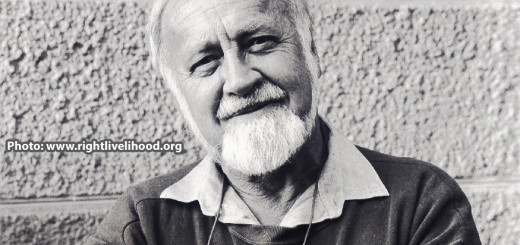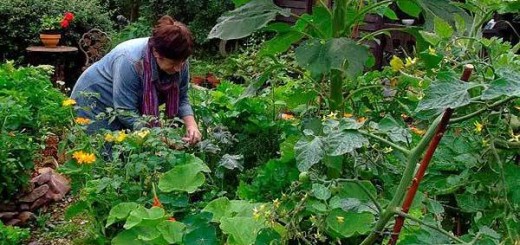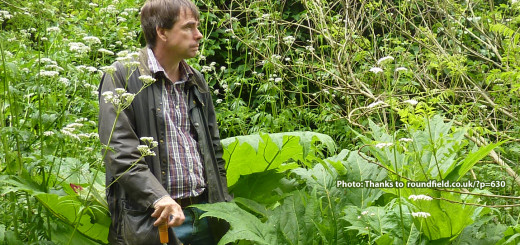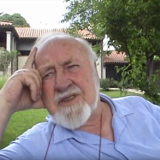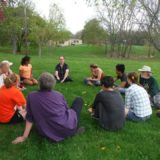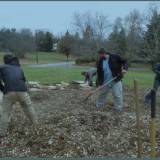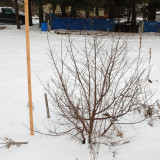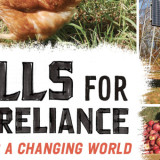Bill Mollison Croatia Interview Transcript
In the interest of the public good, and because I’ve enjoyed listening to this interview several times, I’ve transcribed the dialogue from it below. Bill was slowing down and approaching the end of his days here (age 77 in this interview, he died in 2016 at 88). His speech was a bit slurred at times but I’ve done my best, and think I’ve been able to faithfully transcribe 99.5% of it (I’ll put parentheses around a few bits I couldn’t quite confirm).
Interview with Bill Mollison / June 2005
Description from Youtube (posted by user ‘ecofilm‘)
I made this Interview with Bill Mollison, “Father of permaculture”, at the International Permaculture Conference in Motovun, Croatia in June 2005. Sorry about the sound trouble that pops up sometimes.
Mollison talks about the future of the earth, permaculture, life and death, community, spirituality, Fukuoka, GMO…
He’s quite a special personality, see yourself :-). In his lectures – if people went to sleep (according to him), he would throw a chair through the room, to wake everybody up.
—————————————–
Q: What was or is your motivation for practicing Permaculture?
A. Well, it’s very simple. It’s anger, and actually, fury. I have no other motivation.
Q: Fury about?
A: The senseless destruction that we’re visiting on the Earth, and the way people in poverty and hunger are treated. The global monetary system and its ignorance, and just generally the fact that we could do SO much better, and we don’t. We just ignore what’s happening, so, I’m very angry. I don’t think anything else will keep you going, like I have been going, except anger. I haven’t got any love in me at all. And I HATE community. That’s part of the other thing that makes me furious, two things really; Spiritualism and Community.
Q: Why is that?
A: Well, people that talk about Community want to manage other people, and people don’t like being managed. I grew up in a village, and people say that is a Community, well it isn’t, it’s a lot of individuals following the rules. And Spiritualism is, I’ve found most people who are spiritual are very greedy and very avaricious, and waste a hell of a lot of time. And there’s another thing, nobody deserves what they’re promised by spiritual people. Some people promise them eternal life…I think it’s horrific punishment for anybody, even if you’ve murdered a lot of people, to get eternal life. Just ordinary people should never have such punishment visited on them. I can’t stand that. I avoid all religions like the plague because just the threat of eternal life is enough to put me right off.
Q: So what’s your belief, what will happen after you die?
A: Ah, I’m the same as Aborigines. You die. You lay down, or somebody lays you down. Flies come and lay maggots in your ears and nose, up your orifices, maggots eat your body and then crawl off and bury in the soil, and the wind blows, and slowly you disappear into the surrounding country.
Q: If you look at the development of the Permaculture movement over all these years, you created the term, what direction is it going into, do you think, and do you like that direction?
A: It never did have a direction, I’d describe what it’s like as fishing—you teach a group, tell them to go teach. After they go, you don’t know who they’ll teach, you don’t know what they’ll… they did it very successfully and they’re still doing it. It’s started on every continent, the direction it’s going is towards the sea surrounding it, then it has to stop unless you’re swimming. So that’s the only direction, it’s always onwards. Sometimes you might have to go back a bit, but not often.
Q: Are you happy with the state of Permaculture today?
A: I don’t have any feeling about it but one of gratitude. Because such a lot of people I know, because they write to me and phone me and send me messages, that are out there doing what I used to do, and I’m just grateful, that’s all.
Q: And what’s your future wish, do you have a future wish for Permaculture?
A: That it continues, and that it perfects itself. As I see it, what I started was the beginning of something that should happen, but it won’t be me who can finish that job, I’ll be dead, I’ll be maggots, you know.
Q: How would you define Permaculture to a child?
A: To a child? Probably the simplest thing you could say is it’s an attempt to build a good place to live, to live.
Q: What’s your estimation of the actual state of the Earth today, and do you believe that humanity will be changing, will be able to deal with those challenges?
A: Well I agree mainly with the people who are investigating the condition of the Earth, and it’s pretty terrifying. The fact that Europe’s (the Earth’s?) so polluted is saving it from seeing the sky, because if it did, its temperature would rise, not by one degree, but 6 or 10 degrees. And instead of having a few thousand people die on a warm day, they’d have nearly everybody dying. So if you stay polluted you can live, if you clean up your pollution you’ll certainly die. So you’re in a trap already that you can’t escape from.
Q: So would you advise people not to have children anymore?
A: No, why not go ahead and enjoy yourself? It’s good fun having children, it’s good fun getting someone pregnant, it’s good fun having a kid. Have all the fun you can have, you haven’t got that much time!
Q: You created this word Permaculture, can somebody practice Permaculture without ever having heard of the word, and how do you deal with that?
A: I did. It comes from two roots, Perma-nent, to persist through time, and Culture, an activity that supports human existence. So put those together, it’s a persistent system that supports human existence. What I told the child, isn’t it, making a nice place to live. Now, we’ve never done that, really, made a nice place to live. We’ve always destroyed things. And there’s very few old systems, we have (Ifugao) in the Philippines, been there 5,000 years on their rice terraces. You could say they’ve created a permanency, they’re still there, but I think they’ll go soon, there’s too many outside influences coming in.
Somebody has told me their grandmother has practiced Permaculture, and I said (‘Hell of a woman!’) (laughing). What he means is, she grew her own plums and made her own jams and all this sort of thing. And so did my grandma, and so did EVERYBODY’s grandma who was in the country…but Permaculture is something entirely different, it HAS to deal with the monetary and legal structure in which you’re living. We set up our own legal and monetary systems. It has to deal with the efficiency of your housing and of your settlement, and your grandmother never dealt with that I’m afraid. (laughter) Nor does Mr. (Holzer?) or whoever. They fall short of being, that’s my answer to you. People who’ve said they’re practicing Permaculture just want an easy way to say they can. It’s laziness, sheer mental, they’re not disciplined and they’re mentally lazy, right.
Q: What about Fukuoka again, so you’ve met Fukuoka, what do you think about him?
A: We like each other very very much. We’ve walked together in forests and things, talking to each other. And we’re the same underneath. He’s said that. He’s a little bit angrier than me, a bit older than me. I like him. I like Furuno better.
Q: Sorry?
A: I like (Takao) Furuno better than Fukuoka. Fukuoka basically is a scientist’s philosopher. He’s a biological scientist, and he’s turned into a philosopher, a not-very-good philosopher. And while he was doing all this he also became a farmer, not a very good farmer. But slowly he won out on the farm, and then his philosophy took him over so he writes really crappy books now. But I thought The One Straw Revolution was the best book I’d ever read, and I advised all governments, I reviewed it everywhere I could, and I’ve advised all governments to print it and give it away free to farmers. Because it was the ONLY book that sort of started to think about farming, and everybody’s missed what Fukuoka did, Fukuoka collapsed time. And you know if somebody says their grandmother was a Permaculturalist, get out of here. What she didn’t have was any subtlety, which Fukuoka did have. And so what he did, instead of plowing, planting a crop, letting it ripen, harvesting it, plowing, putting in the next crop, he simply sowed the next crop into the mature crop of the one he sowed before, he slid time over time so there wasn’t a pause between crops; crops went down, crops came up—fantastic! And he’s still the only person I know who includes time in every aspect of what he does.
The first person to design anything in landscape was very probably a bloke called (P.A.) Yeomans who set out a Keyline system for catching water in a landscape. There’d never been a book in agriculture on design…now if that doesn’t make the hair stand up on the back of your neck, it ought to. Every book on agriculture says, you know, ’round about May you plow up and put 10 pounds of seeds to the acre and keep ’em cultivated, and take ’em off, you know, at the end of June; it’s all ‘do this now,’ it’s all one-dimensional. Permaculture is multi-dimensional, and one of the dimensions we use is time. We’ve learned that from Fukuoka.
Permaculture is the first book you’ll ever read on design of any system, and it’s design of agriculture, design of housing, design of your financial systems, design for your legal structure, I’ve found it extremely eerie that there was no book on design of agriculture.
Q: How do you think about or estimate the danger of Genetic Engineering and the patenting of seeds?
A: It’s a grave danger to everybody, particularly the people doing it because they get paid much-too-much and they eat much-too-much and they’ll all die of heart attacks, but then we’ll be rid of them. But it’s part, what you’re talking about is a result of a strategy applied by Henry Kissinger, and let me tell you what it was. He said ‘if we move food onto the commodity market, then we can trade to and fro in it. We can own it, because we can buy up the interests in it, and if we control food, we control anybody. We don’t have to go to war or try and persuade ’em, we’ve got ’em by the short and furry. Further, if we invent seeds which they can plant once but never again, then they have to buy those seeds from us always.’ And that’s what you’re talking about I think. You’re talking about a control strategy devised by Henry Kissinger and practiced by the American government. You can decide for yourself whether you’d like to be controlled or not.
Q: So how can we deal with that danger, how can we confront it?
A: Well, I suppose you can assassinate the American government. Well, we did, see? We were out there and we heard Kissinger, so we all started to save seeds that were not tampered with. And we set up seed banks and seed libraries and now we have access to more reproducible seed than ever in history. Because we were frightened that Kissinger would ruin the world’s food supply, and he would’ve, without us. Some of my lady farmers in Africa grow 36 sort of sorghum, and keep it all carefully separated, and so on. So in the Permaculture system there’s more seed saved now than there ever was previously in history. So we’re not worried about Kissinger, we’re worried about all of you people who don’t save seed. You won’t survive, and you’re already under the control of the American government. And we look at you and feel sorry for you, but not TOO sorry, because you never did a fucking thing about saving yourself. I mean, if you are sheep, you should be slaughtered, sure.
Q: (makes sheep sound, Mollison laughs) What is the situation in Australia, actually—is there GMO food there, or how are the laws there? I don’t know, I just know about Europe.
A: I speak of Tasmania, they’ve put a moratorium of 2 years on GMO food, and they’ve extended it for six. Other states have banned it. Some crops are going on trial, some GMO crops. Mostly they couldn’t sell it, nobody wants to buy it, so, and that actually is the whole problem, nobody wants to buy.
Q: So it is labeled, if it’s…
A: No no no, you see, and in America it’s not labeled. If you buy anything from America, you don’t know if it’s GMO or not. In Australia there are already certain crops that are GMO, I think canola oil is one. We never buy that, because you couldn’t buy any that wasn’t genetically-altered.
Q: I saw this film, it’s called The Future of Food, and it’s about this issue, and also the patenting of food, they said that Monsanto went into government seed banks and took normal seeds, not GMO seed but just any seed, and patented them?
A: That’s true.
Q: So how about those Permaculture seed banks you spoke about, are they safe, or are they patented, those seeds?
A: They’re ours, they’re ours, they can’t come in and take them.
Q: So you don’t feel like ‘I have to patent now every seed I’m saving…’?
A: We couldn’t afford to. We looked at it, but we couldn’t afford to.
Q: It’s really expensive to do that.
A: Yeah, very expensive. Like it or not, GMO crops have spread, and I don’t think you can find any corn anymore that isn’t genetically altered, doesn’t contain some of the genetics that were put into corn. So the damage is done for some crops. But nobody wants to buy that stuff, nobody conscious, if it was marked, you can’t sell it. So, the reason why most Australian farmers don’t use GMO seed is that they don’t see any market for it, quite rightly, there isn’t any. I’ve said to people, if I say to you, I have here a seed grown with the assistance of a lot of dangerous chemicals, and I have here Organic seed, which one do you want? And they say ‘I’ll take the Organic seed.’ Only a maniac would want to eat the food produced by dangerous chemicals; on the other hand I think that everybody that grows it should eat it, and none of them do, none of the farmers who grown that sort of food nor the people who work amongst it eat it, they’ve all got home gardens. And the people who don’t ask questions about it should be force-fed it, and most of them (are?), so luckily the system of violence is killing itself.
Q: What’s the plans for your personal life in the coming years?
A: Avoid eternal life, if possible. Still stay away from anything spiritual. I’m a bit scared. I’ll (bet) (?) Vikings are (afront of the sky falling), and I don’t like that. I’m of Viking ancestry. I’m frightened of eternal life, if you get eternal life, what ever do you do if you do? It’d be worse than seeds and stuff. But anyhow I think it’s unlikely and I think I’ll just turn into maggots and crawl away, so I feel much happier about that. My plans are to try and finish writing some of the things I want to write. I don’t know if I’ll do it, I don’t have that long, I suppose. And otherwise you know, live a good life, a quiet life. A good life to me is having a garden, and your friends, and eating food that you want to eat.
Q: Are you going to travel a lot, do you think?
A: No, I’m just about finished. Probably this is my last long trip, because I HATED traveling, and I didn’t start it until I was 54. I love where I live, and I felt it was a duty, and I was angry. So, though I’m still angry, I think I did my duty. If any other individual does their duty as well, we’ll have the whole earth covered. And I have students of whom I’m very, very proud, and to them I’m very, very grateful, because they’ll finish the job.
Interview footage © 2005 OkoFilm / ecofilm.de
